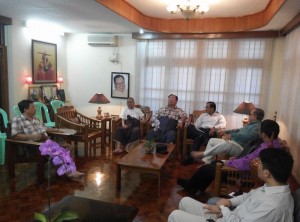
Although the possibility exists that a nationwide ceasefire agreement may be reached within this current government, there is no possibility for the conclusion of political talks during this presidential term, says Nai Hongsar, leader of the Nationwide Ceasefire Coordination Team (NCCT).
According to Nai Hongsar, once a nationwide ceasefire agreement is reached, political talks must ensue, which will take longer to conclude than the current government term allows.
“During this government term, there is [the] possibility that [a] ceasefire [agreement] can be reached completely, but, for [the] political talk, it needs [more] time. The term for this government will end after 2015. After mid-2015, the country will be busy with the general elections, so there is no possibility that political talks may conclude during this government administration,” Nai Hongsar told IMNA during a November 11th interview conducted at the residence of Khun Htun, following a meeting between the NCCT and United Nationalities Alliance (UNA).
According to Khun Htun Oo, leader of the Shan Nationalities League for Democracy (SNLD), the NCCT and UNA met on November 11th to exchange both side’s points of view and experiences regarding Burma’s political situation.
“We [the UNA] explained what was discussed when we met with the President; it was nothing special. They [the NCCT] explained their situation; it’s not a very important issue,” said Khun Htun Oo.
At a recent informal meeting held between the Union Peace-Making Working Committee (UPWC) and the NCCT, held on November 10th, both sides agreed to hold another round of peace talks at the end of November.
Nai Hongsar remarked that the 6th round of peace talks were held back in September, and the reason that the next round of talks has been delayed is due to the Tatmadaw (Burmese Army).
“The reason the peace talk [has been] delayed, is concerned with the Tatmadaw. The Tatmadaw does not seem to really accept the points of federalism,” said Nai Hongsar.
At the 6th round talks, the NCCT and UPWC concluded the talk without having completed the draft of a nationwide ceasefire, while many other points were left unsettled.
According to the NCCT, the result of the upcoming round of peace talks depends heavily on the points presented by both sides.
According to U Aye Thar Aung, leader of the UNA and chairman of the Rakhine National League for Democracy, the UNA has worked hard in order to achieve a ceasefire agreement, and will continue to do so.
“It is impossible to carry [on] like this. If a ceasefire is not reached and peace is not achieved, it will be impossible for the country to stop the cycle of poverty. So, we [the UNA] went to Chiang Mai to meet with the NCCT,” said U Aye Thar Aung, in an interview with IMNA.
Attendance of the November 11th meeting between the UNA and NCCT included Khun Htun Oo and U Aye Thar Aung of the UNA; Nai Ngwe Thein, chairman of the Mon National Party (MNP); and Nai Hongsar, Khun Okkar, Saline Htar, and U Htun Zaw of the NCCT.
